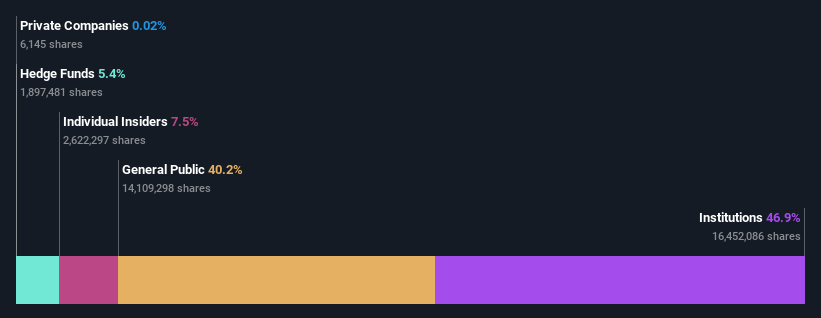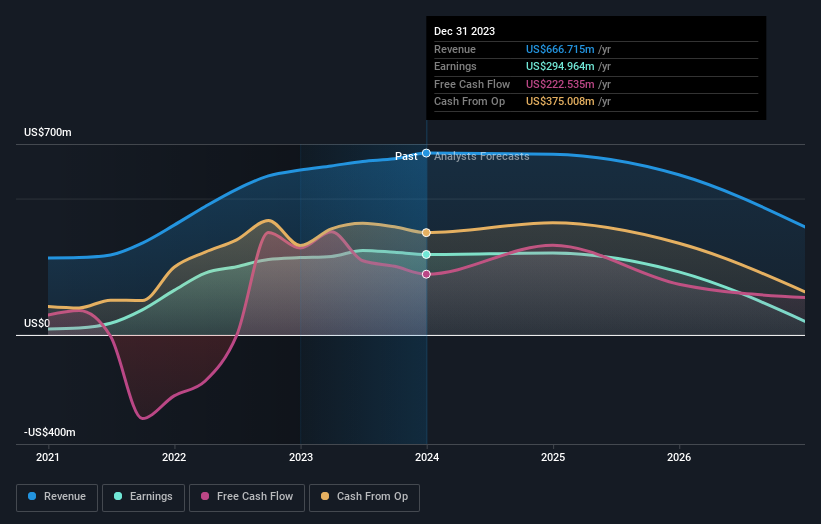Stock Analysis
- United States
- /
- Marine and Shipping
- /
- NYSE:GSL
Institutional investors have a lot riding on Global Ship Lease, Inc. (NYSE:GSL) with 47% ownership

Key Insights
- Institutions' substantial holdings in Global Ship Lease implies that they have significant influence over the company's share price
- 50% of the business is held by the top 25 shareholders
- Ownership research along with analyst forecasts data help provide a good understanding of opportunities in a stock
To get a sense of who is truly in control of Global Ship Lease, Inc. (NYSE:GSL), it is important to understand the ownership structure of the business. We can see that institutions own the lion's share in the company with 47% ownership. In other words, the group stands to gain the most (or lose the most) from their investment into the company.
And things are looking up for institutional investors after the company gained US$52m in market cap last week. The one-year return on investment is currently 29% and last week's gain would have been more than welcomed.
Let's delve deeper into each type of owner of Global Ship Lease, beginning with the chart below.
See our latest analysis for Global Ship Lease

What Does The Institutional Ownership Tell Us About Global Ship Lease?
Many institutions measure their performance against an index that approximates the local market. So they usually pay more attention to companies that are included in major indices.
We can see that Global Ship Lease does have institutional investors; and they hold a good portion of the company's stock. This implies the analysts working for those institutions have looked at the stock and they like it. But just like anyone else, they could be wrong. If multiple institutions change their view on a stock at the same time, you could see the share price drop fast. It's therefore worth looking at Global Ship Lease's earnings history below. Of course, the future is what really matters.

It would appear that 5.4% of Global Ship Lease shares are controlled by hedge funds. That worth noting, since hedge funds are often quite active investors, who may try to influence management. Many want to see value creation (and a higher share price) in the short term or medium term. Because actions speak louder than words, we consider it a good sign when insiders own a significant stake in a company. In Global Ship Lease's case, its Top Key Executive, Georgios Youroukos, is the largest shareholder, holding 6.4% of shares outstanding. With 5.7% and 5.5% of the shares outstanding respectively, Morgan Stanley, Investment Banking and Brokerage Investments and Punch & Associates Investment Management, Inc. are the second and third largest shareholders.
Our studies suggest that the top 25 shareholders collectively control less than half of the company's shares, meaning that the company's shares are widely disseminated and there is no dominant shareholder.
Researching institutional ownership is a good way to gauge and filter a stock's expected performance. The same can be achieved by studying analyst sentiments. Quite a few analysts cover the stock, so you could look into forecast growth quite easily.
Insider Ownership Of Global Ship Lease
The definition of an insider can differ slightly between different countries, but members of the board of directors always count. Company management run the business, but the CEO will answer to the board, even if he or she is a member of it.
Insider ownership is positive when it signals leadership are thinking like the true owners of the company. However, high insider ownership can also give immense power to a small group within the company. This can be negative in some circumstances.
Shareholders would probably be interested to learn that insiders own shares in Global Ship Lease, Inc.. As individuals, the insiders collectively own US$60m worth of the US$800m company. It is good to see some investment by insiders, but it might be worth checking if those insiders have been buying.
General Public Ownership
The general public, who are usually individual investors, hold a 40% stake in Global Ship Lease. This size of ownership, while considerable, may not be enough to change company policy if the decision is not in sync with other large shareholders.
Next Steps:
While it is well worth considering the different groups that own a company, there are other factors that are even more important. Be aware that Global Ship Lease is showing 3 warning signs in our investment analysis , and 1 of those is potentially serious...
If you would prefer discover what analysts are predicting in terms of future growth, do not miss this free report on analyst forecasts.
NB: Figures in this article are calculated using data from the last twelve months, which refer to the 12-month period ending on the last date of the month the financial statement is dated. This may not be consistent with full year annual report figures.
Valuation is complex, but we're helping make it simple.
Find out whether Global Ship Lease is potentially over or undervalued by checking out our comprehensive analysis, which includes fair value estimates, risks and warnings, dividends, insider transactions and financial health.
View the Free AnalysisHave feedback on this article? Concerned about the content? Get in touch with us directly. Alternatively, email editorial-team (at) simplywallst.com.
This article by Simply Wall St is general in nature. We provide commentary based on historical data and analyst forecasts only using an unbiased methodology and our articles are not intended to be financial advice. It does not constitute a recommendation to buy or sell any stock, and does not take account of your objectives, or your financial situation. We aim to bring you long-term focused analysis driven by fundamental data. Note that our analysis may not factor in the latest price-sensitive company announcements or qualitative material. Simply Wall St has no position in any stocks mentioned.
About NYSE:GSL
Global Ship Lease
Global Ship Lease, Inc., together with its subsidiaries, engages in owning and chartering of containerships under fixed-rate charters to container shipping companies worldwide.
Undervalued with proven track record and pays a dividend.

